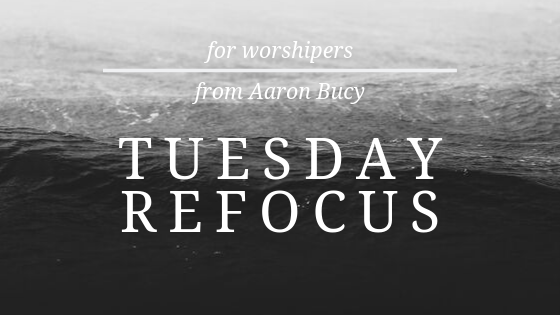Last week I wrote about liturgy. All worshipers are in fact liturgists, but worship leaders carry a unique responsibility to intentionally form the liturgy of our gathered time to form worshipers holistically.
How do we begin to think and plan intentionally in regard to the liturgy of our services?
IDENTIFY YOUR CURRENT LITURGY.
Do you have a set flow of service or number of songs? Do you share communion weekly, quarterly? What is the time allotted to each portion of the gathered service? As you think about worship as formation and discipleship, what elements would like to see more/less during the service? Even if your structure changes frequently as you look back you will see specific patterns emerge in the liturgical life of your church.
SEE THE BIGGER PICTURE OF…
…The People. Spiritual formation and discipleship does not happen overnight. Part of moving people in this journey of formation is identifying where they are right now. Is your church full of new Believers? Intellectuals and academics? Young families? What is the overall spiritual maturity and understanding of those you are leading?
…The Service. To begin integrating more liturgical rhythms into a weekly service we have to think outside of the weekly service. What is the current sermon series? What has been taught over the last six months? Where are the leaders headed after this sermon series? What themes are emerging in our churches, cities, cultures, and the world which need time to be absorbed deeply into the weekly rhythms?
…The Church. The Church is a body made up of many individuals. Being actively involved in the life of your church (apart from your role on a Sunday) as well as being in relationship with others in your church will help you have a sense of the overall direction of the Church. What things are your leaders noticing and wanting to pursue for the health of the community? Are there themes or patterns occurring at the moment? Where do the leaders of the church see the church in five, ten, twenty years?
INTEGRATION AND IMPLEMENTATION
As you begin to identify your church-specific liturgical rhythms in view of the bigger picture, you can begin filling in the places of formation. Scripture and prayer are two easy entry points for those new to intentional liturgy. With limited service time, worship leaders may be tempted to view Scripture and prayer as mere transitions as you tune an instrument, change a CAPO, or move from one element of the service into another. But crafting an intentional liturgy asks you to view the use of Scripture and prayer with as much thought as song choice.
The following are a few traditional liturgical elements that can begin to give some shape for the way you structure your service:
Welcome/Call to Worship
Instead of just shouting ‘Good morning! Please stand!’ how can you use Scripture, and prayer to invite people to join their lives of worship into the worship of God that is already in progress? We join our hearts, lives, and songs with the saints and angels, the Church global, and all of creation responding to who God is and what He has done.
Confession of Sin/Assurance of Pardon
Our congregations are filled with people who are both casual and flippant toward God’s grace, forgiveness, and mercy, and those who feel their sin has pushed them past God’s ability to save and restore. What a gift to give both of those people - and everyone in between - the ability to acknowledge all have sinned and fallen short of the glory of God, and that God in Christ has forgiven us and called us to go and sin no more? This is the beauty of times of Corporate and Individual Confession, and being assured of our pardon.
Confession of Faith
Corporate confessions of faith are at once a reminder to the believer and clarity for the non-believer about who we are, what we believe about God and self, and why it matters. Whether we are using traditional confessions handed down through the centuries like the Apostle’s or Nicene Creed, or a simple call and response like ‘God is good, all the time, God is good,’ we are forgetful people who need to be reminded of who we are and who God is.
Responsive Readings
Responsive Readings can take many forms - a simple call and response, reading Scripture in unison, having a phrase repeated by the congregation, etc. This is another way to put truth in our mouths, minds, and hearts in a way that allows us to hear and be united together as the people of God.
Scripture Readings
As the Western world grows more and more Biblically-illiterate, our people will never be underserved by intentionally hearing the Old and New Testament, the Psalms, and the Gospels read over and over again in our services. Statistics indicate that for some, what the hear from God’s Word during a weekly church service may be their only interaction with Scripture in the week.
Disciple-making is the long-game. Be thoughtful and intentional, move slow, serve well.
Dive deeper into the role and world of liturgical rhythms through these resources:
The Worship Sourcebook (my go-to resource for following the church calendar, prepared readings, and prayers).
Doxology & Theology Podcast (Their series on ‘Read, Sing, Pray, See the Word’ is incredibly helpful).
Know the Creeds and Councils (A book on Church History and the formation of the Creeds which have been passed down through the centuries).
Ancient Future Worship (A book that looks specifically at the liturgical practices of the Church throughout history and up until present day. An excellent resource for anyone new to the world of liturgical rhythms).
A Handbook to Prayer (Although this is intended for personal devotions, I have found it to be helpful in using these Scripture prayers in the corporate gathering as well).



